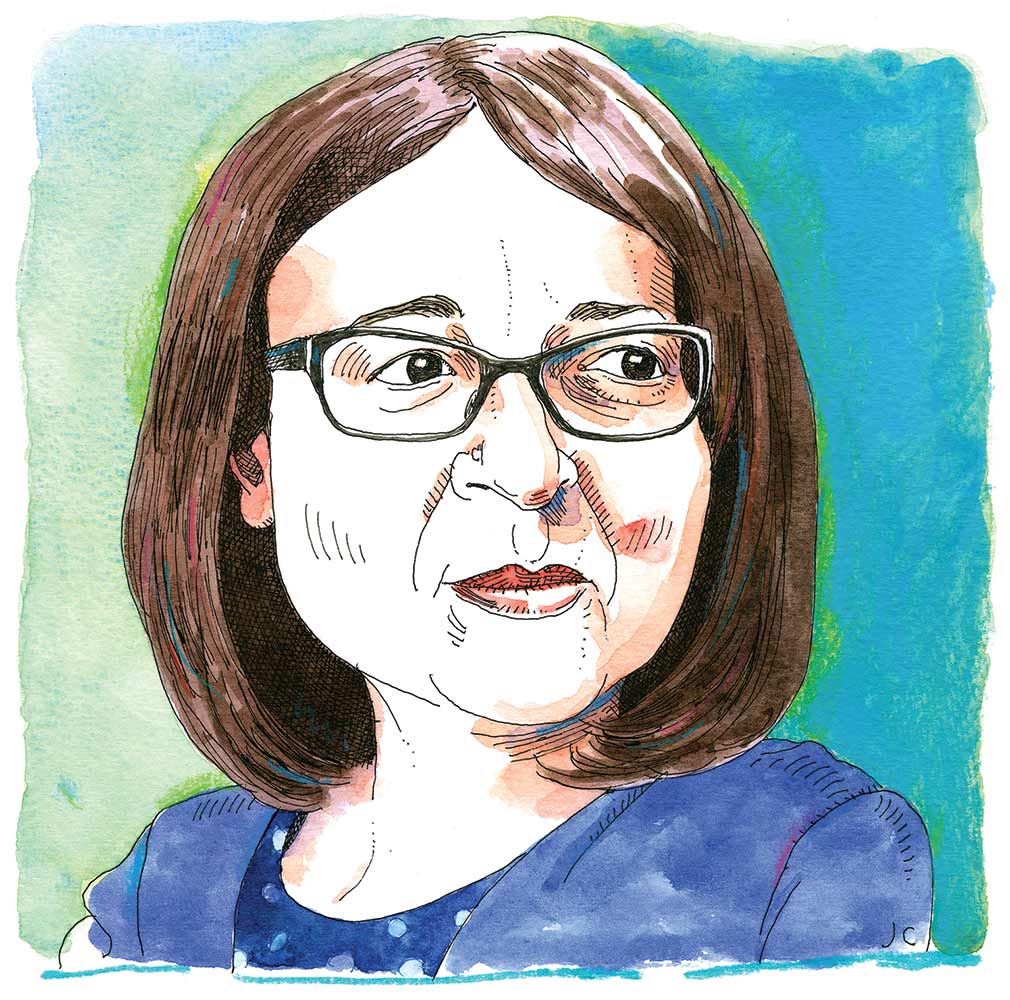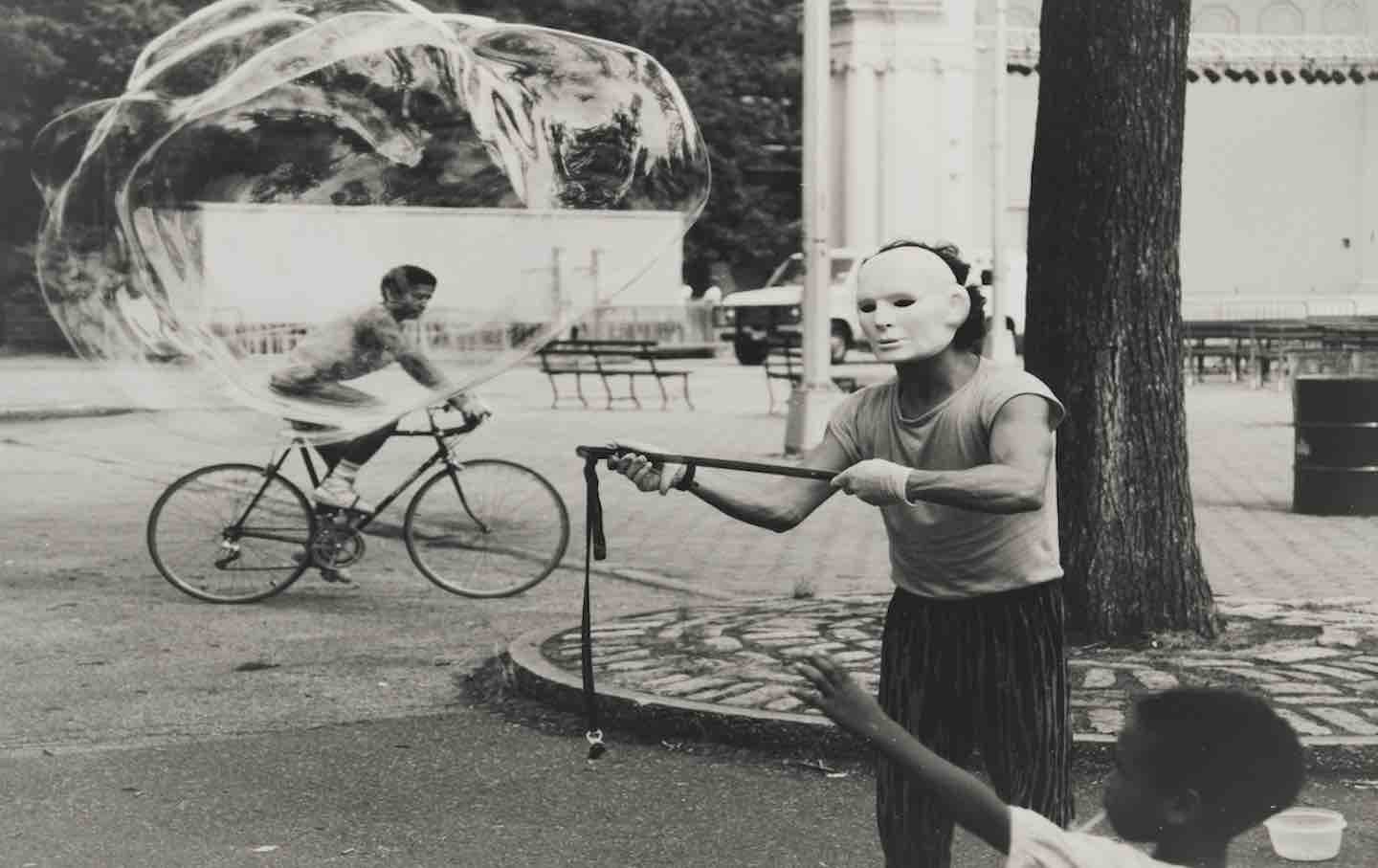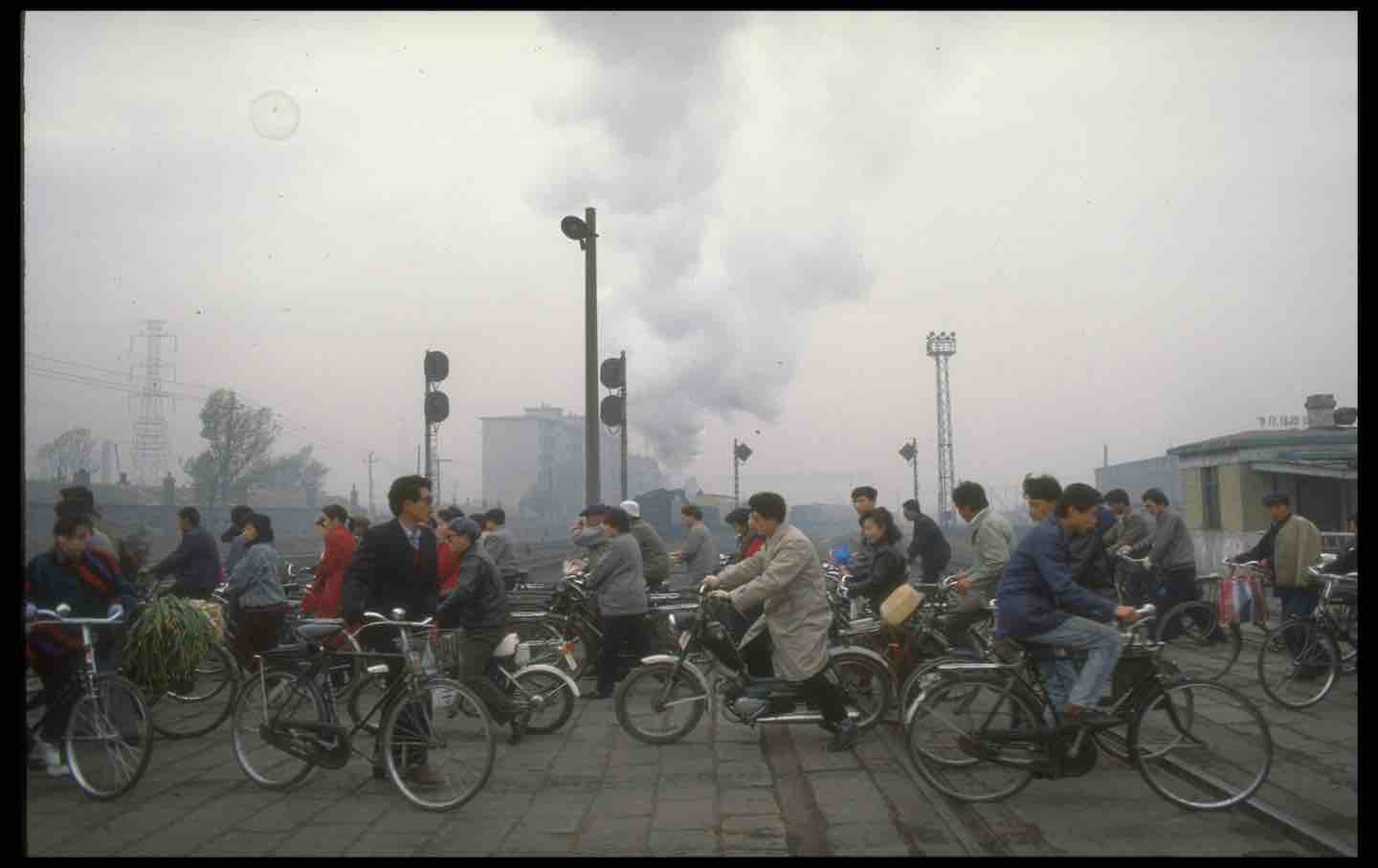Cairo From Afar
The poetry of Iman Mersal.
Iman Mersal’s Lost Cairo
In Threshold, the poet revisits a city that transformed her and a generation of radical artists and intellectuals.

Illustration by Joe Ciardiello.
In prose and verse, the first person has become all too common. Autofiction, and for that matter what might be called “autopoetry,” often seems like a marketing device for the writer’s individual story. It isn’t always bad, but it has become bland by its sheer quantity and pervasive vanity.
Books in review
The Threshold: Poems
Buy this bookAgainst this discourse of self-pitying confession is Iman Mersal. One of Egypt’s leading poets, Mersal has written prose and verse that is highly subjective and oriented around the self, but that she nonetheless does not intend to make herself fully known through. Her poetry, in particular, is bracing, clever, and terse, but slippery too. The self is not her subject so much as an impediment that she writes around; there’s deceit, disloyalty, duplicity, misdirection. While she writes about her own world, she is not writing memoir. Her poetry is confessional but not self-important. There is an almost joyful sense of privacy in Mersal’s poems: She obscures as much as she discloses.
The theme of disclosure is at the center of Mersal’s new collection, The Threshold, ably translated by Robyn Creswell. It opens with a promise by the author to hide behind her “self-exposures.” Even in the first poem, Mersal offers us a tantalizing (if taunting) proposition:
I should tell my friends
how many photos I have of myself,
each representing the real me,
which I’ll send to them one by one.
But what follows is far more than an effort to hide in plain sight: Throughout the collection’s 40-odd poems, Mersal attempts to chart an alternate path of subjectivity. Although she shape-shifts, as a narrator and writer, between her addresses to various lovers, friends, and family members, she also offers us detailed accounts of her upbringing and education in Egypt and, later, her life in Canada. Her poems aren’t about some shabbily rehearsed journey of the self, either literal or figurative; Mersal’s “first person” is about the world—how she sees it, and how the world, in turn, sees her.
Mersal emerged as a poet and writer in the 1990s. The Cairo she started to write in was deeply colored by a sense of disillusionment. Although Egypt had made peace with Israel, it had abandoned its leadership of the Arab world and turned to the United States as its patron. A new business elite, now unfettered by the failed experiment of Arab socialism, distinguished itself for its corruption, while a wave of religious conservatism swept through Egyptian society. There was little use for the engagé intellectual. Older generations of Egyptian writers, who were often leftists and had adulated President Gamel Abdel Nasser’s brave defiance of the colonial powers in earlier decades, felt left in the lurch.
In the past, Egyptian poets had written verse with a sense of political commitment and even hope. Mersal’s 1990s generation rejected such a tone, which sounded bitterly absurd in the era of Hosni Mubarak, when the hopes and dreams of an earlier generation were clearly no longer possible. But out of the ’90s generation’s dissatisfaction came a freer cultural and intellectual scene. New publishing houses and literary journals, such as El Jarad, allowed writers a way to publish outside of state institutions, often in experimental ways they had not attempted before. El Jarad, which printed some of Mersal’s early poems, such as her ironic “Respect for Marx,” reveled in the reprimands of the state intellectuals, who dismissed the new generation as harafish, or “riffraff.” Among Mersal’s contemporaries were Alaa Khaled, a leading figure in the development of the prose poem in Egypt, and Osama al-Danasouri, whose verses often spoke about the world’s ordinary disappointments. In The Threshold, Mersal memorializes their friendship in an e-mail poem that recalls the playful but sardonic tenor of the group. In this poem, al-Danasouri tells Mersal he’s composed a poem about a party that their circle of writers and artists attended in 1992. “‘Away from it all with my friends’ is the title God himself gave to me,” he says mockingly.
The influence of Cairo in the 1990s can be found everywhere in Mersal’s poetry. Her breakthrough collection, A Dark Passageway Is Suitable for Learning to Dance, was only her second book of poems, but it quickly established her reputation. It displayed all the signature elements of her generation of intellectuals and writers, but she had mastered them in a way the others hadn’t. For example, irony, in the hands of a mediocre writer, can be a clever way to avoid questions of meaning or significance. In Mersal’s hands, it became a means of expressing the hardest parts of life. Irony gave her writing meaning, but then pulled it apart and put it back together again. Truth is there, but always shifting. Writing in a flat tone, Mersal heightened this sense of uncertainty, this sense of life doubling back on itself. In her later poems, that irony becomes a way to reflect on the gaps between how the world might choose to see her—as a woman, as a modern traveler, as an immigrant poet—and vice versa. One poem, in which she meets an Afghan woman on a train, sets up a celebratory image of that identity before picking it apart. Mersal ends the poem by casting doubt on her story: “At times, for his own amusement, God leads our memories astray,” she muses. “What I can say is that from down here, among the shoes and jackboots, I’ll never know for certain who triumphed over whom.”
Mersal emigrated to Canada in the late 1990s. There, she began teaching literature at the University of Alberta and writing prose as well as poetry. Her book-length 2018 essay How to Mend: Motherhood and Its Ghosts draws on writers like the lesser-known Syrian poet Saniya Saleh. More recently, Traces of Enayat, newly translated by Robin Moger, explores the years of hopeful modernity in Egypt’s 1950s and ’60s by trying to reconstruct the life of a largely forgotten author, Enayat al-Zayyat, whose single novel, Love and Silence—now a cult classic—was published four years after her suicide. But what is striking is that the Cairo of the 1990s never left Mersal; it remains her greatest subject.
The Threshold’s title poem offers us a passage back to her beloved city. It recounts a night out that begins as Mersal and her friends arrive late to the opera. They are there, she tells us, not for the music but for the spectacle of the audience. After the opera ends, Mersal and her friends spill out onto the streets of the city—moving from smoky bars full of intellectuals to the alleyways of the medieval quarter, where they are mistaken for tourists. The poem ends with a visit to the old cemeteries:
There was nowhere else to go but the City of the Dead.
We stayed there another year
wondering about the smell of guava
and when I decided to leave them all behind
and walk alone
I was already thirty.
Much like the “bonsai fictions” of Charles Simic, the Serbian American writer whose work Mersal has translated into Arabic, many of the poems in The Threshold employ this story-like structure: They begin with an image or a scene and end with a sense of irresolution. They often address how the passage of time—whether reflected in aging or in memory—changes our sense of place. The word “threshold” in Arabic, el ‘ataba, is also the name of the 19th-century area of arcades and markets where the new and medieval areas of Cairo meet, and this feeling of the liminal city is at the center of Mersal’s poems. It is a city that is at once libertine and hidebound, held together by its own social codes and hypocrisies. And it is a city that is also deeply regulated by the differences of class in Egyptian society. Mersal’s early poems suggest how class intersects with the workings of patriarchy and other aspects of Egyptian society—a key theme in modern Arabic literature that foreign critics often overlook in their search for more newsy controversies. In “Mistake,” Mersal muses about what she does to appease “a good man”:
I tie my hair back
to look like a young woman you loved long ago,
always rinse away the taste
of my friends’ beer
before coming home, and never say anything about
God in your presence.
In “Amina,” Mersal addresses an aging and aristocratic leftist who speaks three languages and commands those around her with “this calm assurance as if you’d never left your father’s house.” She may be a Marxist, but the woman is clearly accustomed to the privileges of her class. Foreign critics also forget that so many of the writers of modern Arab literature are leftists, and so it is not surprising that many of Mersal’s poems function almost as a roman à clef about the Egyptian left. She handles the people described in them with care—but not too much care. She sympathizes with them, but these people are also the reason to doubt anyone’s idealism.
Mersal’s Cairo may be only a couple of decades old, but it is almost gone now. An older generation of often francophone, often leftist intellectuals has mostly disappeared. The aftermath of the 2011 uprising has left a bitter mark on the city’s cultural life, and the return of the police state has badly affected its independent art and literary groups. The old cemeteries where The Threshold’s title poem ends are being cleared away for new highways. Many writers have chosen to leave Egypt to join an Egyptian and Arabic republic of letters abroad.
Popular
“swipe left below to view more authors”Swipe →But at least some of Mersal’s 1990s Cairo survives. It wasn’t so long ago that I sat drinking beer there with Mohamed Shoair, a literary journalist and friend of Mersal’s, at Estoril, a watering hole she once frequented that is still popular with writers, cineastes, and lapsed leftists. At the table next to ours was the doyenne of Egyptian literary criticism, Samia Mehrez, wreathed in cigarette smoke and holding forth before a circle of friends and cultural figures. But there is also the sense of a fading world in The Threshold. Mersal holds fast to her Cairo of littérateurs, even though she moved to Canada two decades ago. Yet through these people, she also explores what it means that the city is no longer accessible to her—and what that feeling of distance has done to her writing and her shifting sense of self. Even the idea of home becomes elusive: “Whenever I arrived in a city,” she tells us in one poem, “I felt my home was in a different one.” “Here as well as there,” she laments in another, “life seems to exist only to be watched from afar.”
Mersal’s sense of dislocation, though, gives the irony she mastered in the 1990s a new, layered complexity. Her poems embrace forms that range from the elliptical essay to the ruminating memoir on family. We are told of her mother’s death when Mersal was still a child, and later of her childhood home in rural, provincial Egypt being torn down. In another poem, Mersal offers us an account of turning 40, discussing her existence as if it were a separate being: “I see my whole life before me and I could even embrace her if I wished, or sit on her lap and sing, or wail.” In this way, her poems are not really confessional; they tell the story of a person, but they also remind us that the self is an idea that itself is always just out of reach. Mersal’s confessions can never fully escape her sense of irony.
For some critics in Egypt, the ’90s generation that Mersal was a part of had taken a self-absorbed or inward turn. They wrote shi’r al mirhad, or “lavatory poetry.” Poets like Ahmad Yamani wrote ugly and aggressive verses about their sex lives—a tone that anticipated the bawdy style of the contemporary Egyptian music called mahraganat. The self-exposition of writers who spoke about personal issues of anger, about seamy affairs and ignoble hatreds, was deemed unliterary when compared with the heroic values of their predecessors. But Mersal and her generation, by giving voice to their disillusionment in a period of uncertainty, helped create a new mode of Egyptian art.
Mersal grew up in a country overshadowed by its defeat in the 1967 Six-Day War and the end of Nasserism. It is often said that those two events marked the end of a golden era in Egyptian letters. But the decades of nationalist glory were also responsible for laying down a suffocating state-supported culture, and Mersal and her ’90s generation found a way to break free, to confront a literary establishment that was still run largely by male intellectuals who claimed the mantle of leftism but were often deeply chauvinistic. Poetry in 20th century Arab society ranked as the highest register of national feeling, and as Creswell notes in his introduction, the icons of its canon, such as Mahmoud Darwish and Adonis, spoke in the language of “latter-day prophets.”
Mersal charts an alternative path—one that uses the self to observe the world around it but refuses any claims to prophecy or universality. Her poems helped carry the Arabic poetic tradition forward, Creswell writes, but “in the form of a critique, or betrayal.” Her version of autofiction recalls the painterly idea of a mise en abyme; her representations of the self fold into further images of that representation and cast doubt on the veracity of any single view. There is no self-fulfillment in her poems: Every encounter, every departure or return home, stirs up and dispels a sense of the self. That inconstancy gives her writing a worldliness and a specificity. It does something that perhaps only poetry can do. There’s no small irony in the fact that, as an Egyptian poet whose generation sought to break the genre, Mersal continues to write in it. Perhaps poetry, even without rules and ideals, is still a lasting form.
More from The Nation

TikTok’s Incomplete Story TikTok’s Incomplete Story
The company has transformed the very nature of social media, and in the process it has mutated as well—from tech unicorn to geopolitical chesspiece.

Did We Get the History of Modern American Art Wrong? Did We Get the History of Modern American Art Wrong?
The standard story of 1960s arts is one of Abstract Expressionism leading into Pop Art and minimalism. A Whitney show proposes an altogether different one centered on surrealism.

The Bleak History of the American Work Ethic The Bleak History of the American Work Ethic
In Make Your Own Job, Erik Baker shows just how long Americans have scrambled to pile work on top of work—and at what cost.
The Banal Spectacle of “Avatar: Fire and Ash” The Banal Spectacle of “Avatar: Fire and Ash”
Has James Cameron’s epic sci-fi series run aground?

The Dislocations of Shuang Xuetao The Dislocations of Shuang Xuetao
The Chinese writer’s fiction details how the country transformed on an intimate level after the Cultural Revolution.

An Absurdist Novel That Tries to Make Sense of the Ukraine War An Absurdist Novel That Tries to Make Sense of the Ukraine War
Maria Reva’s Endling is at once a postmodern caper and an autobiographical work that explores how ordinary people navigate a catastrophe.


